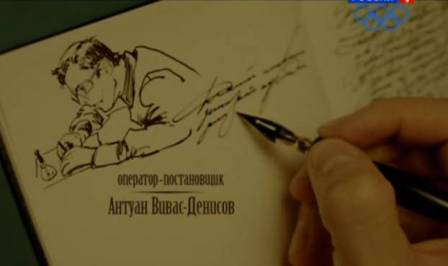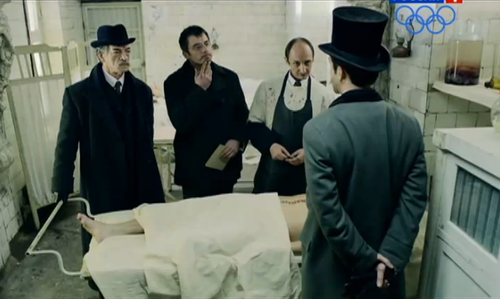Review: New Russian Holmes 01×03-04 – Rock, Paper, Scissors
Review By Sigita Matulaityte for The Baker Street Babes
Curly’s lovely flatmate strikes again with a review of the second two-parter from the new Russian Sherlock Holmes Series.
ШЕРЛОК ХОЛМС airs on россия 1. It’s available online to watch (in Russian) at http://russia.tv/video/.
Episode 3-4 “Rock, paper, scissors”
The second story in the series is the same as in canon: The Sign Of Four, albeit the case name and some significant details are changed. The absence of Mary Morstan for example, though we have another fair lady in her place, as evidenced in the main trailer: Mrs. Hudson, played by Lithuanian actress Ingeborga Dapkunaite is Watson’s age in this series and our doctor appears to have started developing a soft spot for her.
I must say, I really like the way each episode starts: Watson’s voiceover following his pen on the pages of his diary (with the show credits), the doctor also has a dab hand at illustrating. This time we get a description of Holmes: his person, his hands, his work on chemical experiments (I think the description is taken word for word from the books but my Russian is too weak to be 100% sure).
Great likeness, isn’t it?
We also get treated with the aftermath of another friendly boxing match between our heroes: it appears that Watson has taken on training Holmes in this regard. They enter Watson’s room to treat Holmes’ face after a missed blow, nothing serious though, as proved by the lighthearted mood of the duo. I love it that Petrenko’s Holmes likes to laugh and in this case he’s laughing at his own clumsiness.
Watson says, continuing their previous conversation, that Holmes reminds him of Edgar Allan Poe’s Dupin, he believed that people like that only existed in fiction. Holmes of course disagrees, it’s not a compliment to him being compared to Dupin – another nod to the books there. We also get the Watson’s pocket watch examination scene but this time Holmes is telling another story to Watson, challenging him on his fascination with stories about crime, blood and murder (it’s evident though that he makes conclusions about the previous owner of the watch too, just keeps them to himself at the mean time). They get interrupted with noise downstairs, a man’s voice and Holmes asks: “What do you think, this one’s yours or mine? Man in his thirties, very agitated.” A few seconds later an injured man stumbles through the door and collapses, Watson catches him and shouts orders to Holmes to bring his medical kit while he’s putting the injured man on the bed. The doctor repeats “Look at me, look at me, Small!” and we realize that he knows this man. A few seconds later the man dies in Watson’s arms, letting the parcel full of jewelry slip from his fingers. Of course, at that moment Lestrade knocks downstairs at the door in pursuit of the now deceased. Watson in the meantime hides the parcel and Lestrade after questioning them takes the body to the police station.
The doctor tells Holmes afterwards that Peter Small was his army buddy with whom he served. We get the first flashback to the time when Watson and Small were captured by enemy soldiers and were forced to play “Rock, paper, scissors” to decide which one of them was losing his leg. Watson repeatedly ordered Small to look in his eyes when playing that game so they kept making the same gestures. The enemy soldiers got angry and turned them around from each other. Watson shouted to Small to keep listening to him, however it didn’t help and Small lost the game, then his leg up to the knee. Watson is very shaken while telling this to Holmes. This is another thing that I like about this version: they address the psychological issues of a former soldier coming back from war and having to adjust. Conan Doyle didn’t directly address them, only mentioning physical injuries, however it doesn’t mean that those issues didn’t exist in that time. The other Sherlock Holmes adaptation that deals with these issues is BBC Sherlock series – but it being set in modern times, it’s no wonder, they had to do it. This adaptation is set in Victorian times where it was unheard of and I applaud the creators for doing it because it shows Dr. Watson in another light. Mind, I love Jude Law’s portrayal of the coolest, kick ass Watson and the Guy Ritchie films are all about the action but I always felt that this character had more depth than that. Watson was always in the shadow, an eternal sidekick, he was just a voice to the audience in the bright light of Holmes genius, however there’s more to him that meets the eye. That’s why I already love this version of Watson: we finally get to see all sides of this amazing character. Mind, this doctor Watson kicks ass as well as BBC or Ritchie’s Watsons and we get treated to him expertly shooting the bad guys during the river boat chase. But we also get his reaction to it: it’s obvious in the aftermath that he is really disturbed with what he had to do, how many people he had to kill again despite the fact that they were murderers chasing them. This Watson hoped to leave the war behind but it caught up with him. While BBC’s Watson feels better being back in action – and this fact defines Martin Freeman’s Watson as more of an action hero – Panin’s Watson doesn’t.
Both Holmes and Watson in this series feel more human, more down to Earth, more vulnerable. We get to see this side of Holmes in the scene with a beautiful young woman, appearing unexpectedly in 221b. They never mention her name but we already know who that is, we’ve seen her picture in his room before – it’s The Woman herself, Irene Adler. Their relationship is different from the books: it’s clear that this Holmes had genuine feelings for her (maybe still has, he does keep her picture) but she deceived him and broke his heart. He hasn’t forgiven her for that. Irene tries to convince him that she made a mistake then and asks, even begs him to go away with her. Holmes refuses to believe and basically throws her out, although it’s apparent that he is very much affected by it. He was right of course not to trust her because a few moments later he realizes that she stole an important piece of evidence from his coat pocket. All the awards to Igor Petrenko for his painfully beautiful performance in this scene. I know that a lot of Sherlockians are very vocal about Irene being used as a genuine love interest for Holmes in some adaptations. I never liked the way Irene was portrayed in Guy Ritchie films, here however it works surprisingly well. Yes, it differs from canon quite a lot but then this series never claimed to be a direct adaptation in the first place.
We also get treated to Mycroft Holmes in this episode… sort of. We never get to see his face, he kidnaps his little brother with Lestrade’s (!) help to discuss details of the case which has a lot of political significance because one of the persons killed in that carriage was an Indian prince. A really interesting take on another iconic character (I must say though, Mycroft’s voice is absolutely swoon-worthy, deeper and more tender than Sherlock’s). The relationship between brothers is the same as in BBC version: a bit strained, though in this case it’s Sherlock who is not satisfied with the status quo. But it’s a short scene so the viewer doesn’t get more from it.
This is the most that we get to see of the mysterious elder brother. Picture courtesy of spiritcc.tumblr.com
Speaking of mysterious glimpses of iconic characters – at the end of the episode it’s obvious that Moriarty is connected to this case, we only see his hand though drawing the curtain of the carriage window but I am quite certain that he was involved (somebody had to hire Irene to steal the evidence from 221b).
Oh, and Lestrade has apparently mellowed a bit in regards to Holmes: he sincerely thanks him for his help (although of course only after his speech that police has a lot of work to do without his interference).
Among other gifts that this series provides us with is the disguises, Holmes uses plenty of them. Out of new adaptations only Guy Ritchie’s verse does it (though I still have hopes for BBC or Elementary to do it someday). To this Holmes though it’s not a special occasion, it feels it’s one of his usual instruments in his line of work – just like in canon (and he’s good at them, not like Robert Downey Jr’s Holmes in the infamous train scene in Game Of Shadows).
I will not discuss any more plot details (the irritable old ladies from downstairs in 221b moved out, thankfully, after their ultimatum to Mrs. Hudson that “it’s us or them”) but I can say that this case felt way smoother than the previous one, it kept me glued to the screen and the way it has been resolved was a thing of beauty. Kudos to the writers and the cast, especially the late Andrey Panin. I wish he could have seen it for himself what an amazing gift his performance is to us.

